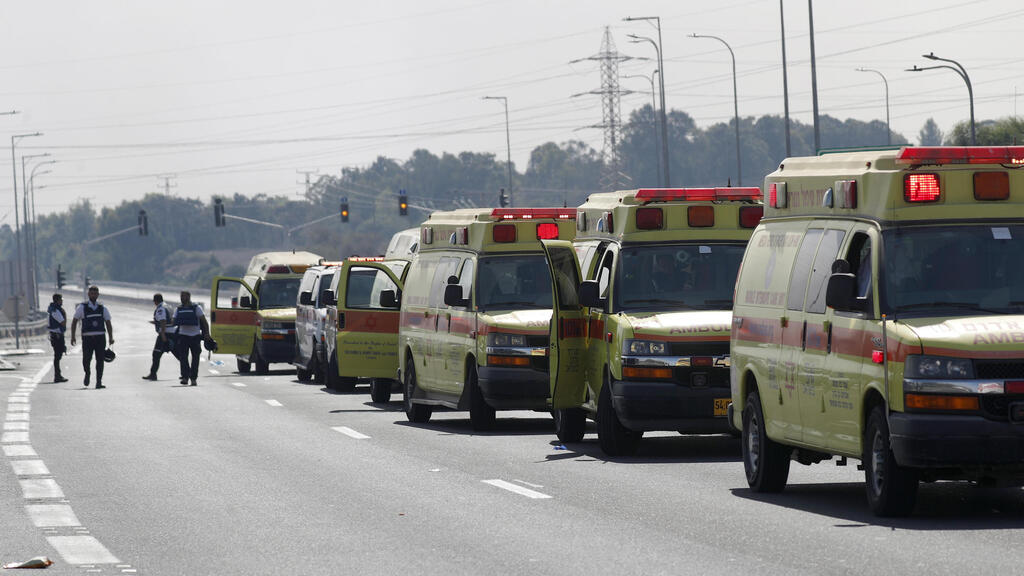Getting your Trinity Audio player ready...
In the hours after the murderous Hamas attack on Gaza border communities, a senior physician in a major Israeli hospital found himself called on to treat one of the terrorists involved. He says he did not hesitate for a moment.
Read more:
"Our obligation to provide medical care is deeply ingrained in our moral, professional and human essence as health care providers," he and the nurse who worked by his side affirmed. When terrorists come to the hospital in dire need of medical attention, the course of action should be straightforward: provide treatment. The legal system can determine their fate afterward."
1 View gallery


Israelis wounded in Hamas terror attack evacuated to hospitals
(Photo: EPA/ATEF SAFADI )
Four days after the tragic attack in Gaza, Ynet reported that terrorists involved in the massacre were receiving medical treatment alongside injured Israelis in several Israeli hospitals. Consequently, the Minister of Health, Moshe Arbel, informed the prime minister in a letter that treatment for terrorists would cease. Subsequently, public hospitals in the central region started transferring terrorists to the Israel Prison Center.
'Our duty to provide treatment lies in our moral, professional and human DNA'
"In the past, I've encountered situations where I had to treat terrorists," the doctor said. "However, there's no denying that the enormity of the horror matches the enormity of the difficulty. None of us have faced a tragedy on the scale of what transpired on that fateful Saturday. Nevertheless, there is no question about whether to provide medical care to save lives. It is not about selection or convenience. As medical professionals, myself and my colleagues, we are duty-bound to provide medical care to every patient, and it is our responsibility to approach this task in a humane manner. Our responsibility to provide medical care is ingrained in our moral, professional and human DNA as health-care professionals. Being a doctor or a nurse is not merely a job; it is a fundamental part of who we are as individuals. Therefore, when a terrorist seeks lifesaving medical care, the decision should be clear – to provide treatment. Let the court determine their fate afterwards."
What can you tell me about the terrorist you treated?
"He suffered orthopedic injuries, an abdominal wound and eye injuries, necessitating critical medical treatment. Following surgery, he was hospitalized, and upon emerging from anesthesia was transferred to the Israel Prison Service's medical center."
Were injured Israelis placed beside him?
"No, in such situations, we use judgement. He was placed in a separate room, and there were no other patients in the adjacent rooms. He was not placed alongside individuals injured in the incident or other patients."
When did you realize you were treating a terrorist?
"I was informed prior to his arrival. Given the complexity and delicacy of the circumstances, soldiers were stationed to guard him."
While treating him did you think: 'Maybe this is one of the terrorists that raped women?' or 'maybe he murdered children?'
"Throughout the treatment, there is a complete disconnection from the situation. I absolutely think about it, but only after I've concluded the treatment and exited the room, particularly when I'm driving home."
What was the medical team's response to your treatment of him?
"There were mixed emotions. While most of the team unanimously agreed on the necessity of treating him, a portion found a flaw in this absolute commitment. The moral dilemmas and challenges pushed us to the edge of the fine line between ethics and emotions. All these comments are entirely understandable, as long as the ultimate decision is to provide treatment."
What do you say to the doctors who declare their refusal to provide care to terrorists?
"This is an incredibly dangerous route we must avoid. Despite their malevolence, without a commitment to care for everyone, individuals might decide whom to treat based on personal judgment. This establishes a dangerous precedent – one we must firmly avoid."
"If I don’t provide him with medical care, I am no different form the people of Hamas"
The chief nurse at the same hospital, who tended to the terrorist, acknowledges the complexity of the situation.
"Last Thursday, at 6 a.m., I received information that a terrorist, previously hospitalized in another facility, was on his way to our emergency room," she recalls. "I felt terrible about it. I was extremely stressed because I didn't know how the team would respond. While we have treated terrorists before, given the enormity of this disaster, I knew it wouldn't be straightforward this time. I approached each nurse individually, asking who was willing to care for him. Two nurses sat down, clearly distressed, and began to cry. I realized there was no option but for me to handle it personally. My deputy agreed to assist. Later, another nurse, whose husband is a police officer, volunteered to help despite the immense challenge. The three of us shared the responsibility."
What did the treatment involve?
"It involved routine medical procedures: administering and altering infusions, monitoring vital signs. In his situation, there was an additional need to change diapers."
And how did it make you feel? What were your thoughts like?
"This is undeniably one of the most challenging tasks I've ever faced as a nurse. What provided me with solace was the knowledge that, once he recovers, he will be thoroughly investigated and, therefore, would contribute to our nation's safety. I reminded myself that refusing to care for him would make me no different from Hamas terrorists. I, unlike them, retain my humanity. Throughout his treatment, various disturbing thoughts like 'Why did he do this?' would surface, but whenever thoughts about 'What exactly did he do?' arose, I pushed them aside; otherwise, I wouldn't have been able to continue. I eagerly awaited the end of his treatment and his transfer to the Israel Prison Center, and when it finally happened, I breathed a sigh of relief."

